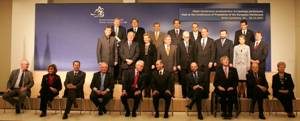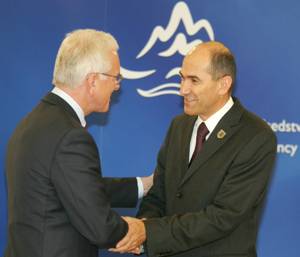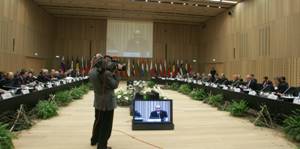This afternoon the Prime Minister of the Republic of Slovenia, Mr Janez Janša, together with ministers of the Slovenian Government, held a working meeting with the Conference of Presidents of the European Parliament, currently on a two-day visit to Slovenia. He also met separately with the President of the European Parliament, Mr Hans-Gert Pöttering.

(Photo: Kristina Kosec/Bobo)
Discussions with the Members of the European Parliament centred on the priorities of the Slovenian EU Council Presidency. Special attention was paid to the energy and climate change package and to the situation in the Western Balkans, with particular emphasis on the question of the future status of Kosovo, all topics that, according to Prime Minister Janez Janša, will require greater coordination between the European institutions.

(Photo: Kristina Kosec/Bobo)
As the Prime Minister stated at the press conference, the European Parliament is involved in many major decisions under the legislative co-decision process, and so “good cooperation with the European Parliament also means better results for the Presidency”. It is the Prime Minister's firm conviction – as has already been confirmed during its present parliamentary term of office – that the European Parliament will have no difficulty in also taking on the enhanced role given to it by the Lisbon Treaty signed a few days ago.

(Photo: Kristina Kosec/Bobo)
In January 2008 the Prime Minister, Mr Janez Janša, will present the programme of the Slovenian Presidency to the Members of the European Parliament at the plenary session of the European Parliament. Afterwards, he will report on the conclusions of the two European Councils held in March and June, and on the results of the six-month Slovenian Presidency. He announced that Slovenia will respond to the initiatives of the European Parliament as and when they are introduced, it will participate in plenary sessions and in the sessions of working bodies and will pursue the policy of close cooperation with all European institutions. In the first half of 2008, a number of events will take place in the European Parliament to improve intercultural dialogue within the European Union, as well as between the cultures of the EU and those in its immediate and wider neighbourhood.